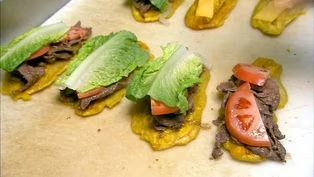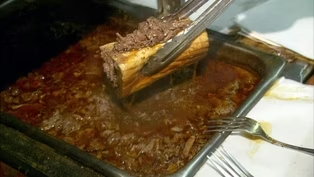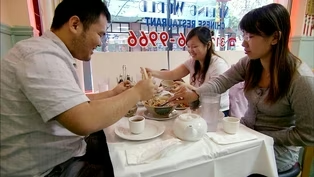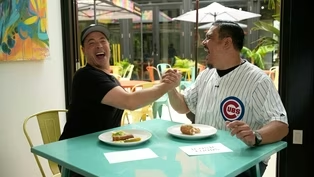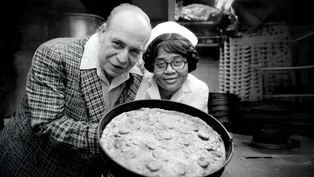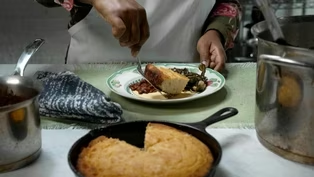Chicago Stories
A Symphony on a Bun: The Chicago-Style Hot Dog
Clip: 10/17/2025 | 6m 27sVideo has Closed Captions
Immigrant influence created the Chicago-style hot dog.
Generations of immigrant influence helped create the “symphony on a bun” that is the iconic Chicago-style hot dog.
Problems playing video? | Closed Captioning Feedback
Problems playing video? | Closed Captioning Feedback
Chicago Stories is a local public television program presented by WTTW
Lead support for CHICAGO STORIES is provided by The Negaunee Foundation. Major support is provided by the Abra Prentice Foundation, Inc. and the TAWANI Foundation.
Chicago Stories
A Symphony on a Bun: The Chicago-Style Hot Dog
Clip: 10/17/2025 | 6m 27sVideo has Closed Captions
Generations of immigrant influence helped create the “symphony on a bun” that is the iconic Chicago-style hot dog.
Problems playing video? | Closed Captioning Feedback
How to Watch Chicago Stories
Chicago Stories is available to stream on pbs.org and the free PBS App, available on iPhone, Apple TV, Android TV, Android smartphones, Amazon Fire TV, Amazon Fire Tablet, Roku, Samsung Smart TV, and Vizio.

Chicago Stories - New Season!
Blizzards that brought Chicago to a standstill. A shocking unsolved murder case. A governor's fall from power. Iconic local foods. And the magic of Marshall Field's legendary holiday windows.Providing Support for PBS.org
Learn Moreabout PBS online sponsorship- [Narrator] Generations of immigrants made ends meet by selling food from their homelands off push carts in Chicago's many open air markets.
- The dynamic there was intense, I would say, with people shouting, throwing things.
- For the immigrants, for the new arrivals, it just makes sense for them to start cooking.
It's something that they take with them.
It's up here.
So cooking is just an easy way to kind of get into the culture and start making a buck.
- It was sort of the first level immigrant job, as it in some ways still is.
It was something you could come in, start up with much capital.
- They would often take old prams or old baby buggies and outfit them with a steamer.
And there you go.
You are an independent businessman.
(bright music) - [Narrator] With the city's population swiftly rising across the 19th century to nearly two million people, vendors found plenty of hungry customers, and it was at the Maxwell Street Market that one of Chicago's largest immigrant groups, the Germans, introduced a food now considered all American, the hot dog.
- My father loves hot dogs.
We'd be driving home from church and he'd take a detour, and he'd go, "I know a really good hot dog stand down here."
- As a friend of mine said, how you ate your hot dog is your religion.
- [Narrator] The German butchers who first came in the late 1840s had a rich culture of sausage making, mixing pork and beef with a full array of spices.
- Germans have roughly 250 or so kinds of sausages, one that has little less salt in it, or coriander in it, nutmeg, they're really good.
- [Narrator] Surprisingly, the German hot dog was not for the masses.
It was a pricey handmade delicacy.
- 200 years ago, people couldn't afford to eat hot dogs.
You had to pay somebody to stand there and chop and chop and chop and chop and chop, and you have to mix it and emulsify it to make the sausage.
- [Narrator] But the commercial meat grinder changed everything, and Chicago's growing Jewish population provided a lucrative market for an all beef option.
- If they're keeping kosher, they have different dietary restrictions, so they wouldn't be eating pork.
(upbeat music) - [Narrator] The all beef hot dog was introduced to the world at the 1893 Colombian Exposition by a pair of sausage makers from Central Europe, Amil Reichel and Samuel Ladany.
The 10 cent meal was such a hit that they stayed in the city, opening the Vienna Sausage Company.
- They made an all beef hot dog, which is still the standard in Chicago today.
- [Narrator] Early on, it was common to call hot dogs frankfurters or wieners, but politics would change that.
- World War I happened and there was a big wave of anti-German sentiment.
People weren't gonna stop eating those sausages, they're too good, but we started calling them hot dogs.
- You no longer see the hot dog having its German roots.
It's American food, it's Chicago food.
- [Narrator] Permanent hot dog stands popped up in Chicago after peddlers were forced off the street by reformers claiming to be concerned with food safety.
- Chicago has a thing against push carts and street vendors.
They thought they were unsanitary.
- Much of this probably has to do with anti-immigrant sentiment, and increasingly laws were passed to make it more difficult to be a peddler.
- [Narrator] As the Depression set in, stand owners hoping to draw more customers experimented with offering free vegetable toppings.
- Everybody's in competition with everybody else, so you need to differentiate yourself.
So you put stuff on it.
- [Narrator] Though the exact origin story is lost to time, the humble hot dog would become the iconic Chicago dog, buried under layers and layers of toppings.
(upbeat music) - A Chicago style hot dog is the perfect metaphor of Chicago.
How do we make it loud?
How do we make it proud?
How do we make it colorful?
- What will you have, babe?
- I'll have a hot dog with relish, onions, tomatoes.
- [Narrator] The Chicago dog follows very strict rules.
- It's an ethnic layering, - So you have the soft bun that's been steeped.
- It's gotta be a steamed poppy seed bun.
- [Speaker] All beef sausage, Jewish, German.
- Chicago style hot dog is an all beef.
You got a beef, natural casing, get the snap.
- Then mustard.
- [Narrator] Mustard, German or East European.
- Then you're gonna get the sweet neon green relish.
- Electric green if you can find it.
- Onions.
- Raw onions.
- From Greek and Italian street vendors, tomatoes, they're Italian, pickles, they pickled everything.
- It's gotta be a sphere.
Can't be chips.
- And hot peppers.
They're called sport peppers.
- And then the celery salt is last.
- Little bit of celery salt, and that's a perfect dog.
- For here?
- Yes, ma'am.
- [Narrator] The final rule, no ketchup.
- Nobody puts ketchup on a hot dog.
- That's a sin.
That is a mortal sin to put ketchup on a hot dog.
- I took my son to this place for this hot dog joint.
He was about 12 years old and he had a dog with everything and I said, "Max, congratulations.
This is your dog mitzvah."
- [Narrator] The beloved drag through the garden dog may sound unusual, but chefs agree, the unlikely combination works.
- When I cook, I try to touch all of the taste buds.
Sweet, sour, salty, sweet, bitter, umami.
Chicago style hotdog does that.
It's got everything.
It's a symphony on a bun.
- I love Chicago Hot dogs.
(laughs)
Chicago’s Handheld Street Foods
Video has Closed Captions
Clip: 10/17/2025 | 6m 50s | Affordable, handheld street food reigns supreme in Chicago. (6m 50s)
Chicago’s Italian Beef Sandwich
Video has Closed Captions
Clip: 10/17/2025 | 4m 17s | The hearty Italian beef sandwich was born in Chicago. (4m 17s)
Chop Suey and Chicago’s Chinese Restaurants
Video has Closed Captions
Clip: 10/17/2025 | 4m 40s | Chop suey became a popular dish at Chicago’s Chinese restaurants. (4m 40s)
The Crosstown Taste Test with Jeff Mauro and Omar Cadena
Video has Closed Captions
Clip: 10/17/2025 | 12m 4s | Jeff Mauro and Omar Cadena embark on a blind test taste of three iconic Chicago foods. (12m 4s)
The Origins of Deep Dish Pizza
Video has Closed Captions
Clip: 10/17/2025 | 5m 29s | Deep dish is the style of pizza most associated with Chicago. (5m 29s)
Video has Closed Captions
Clip: 10/17/2025 | 5m 20s | During the Great Migration, African Americans brought their way of cooking to Chicago. (5m 20s)
Providing Support for PBS.org
Learn Moreabout PBS online sponsorshipSupport for PBS provided by:
Chicago Stories is a local public television program presented by WTTW
Lead support for CHICAGO STORIES is provided by The Negaunee Foundation. Major support is provided by the Abra Prentice Foundation, Inc. and the TAWANI Foundation.
